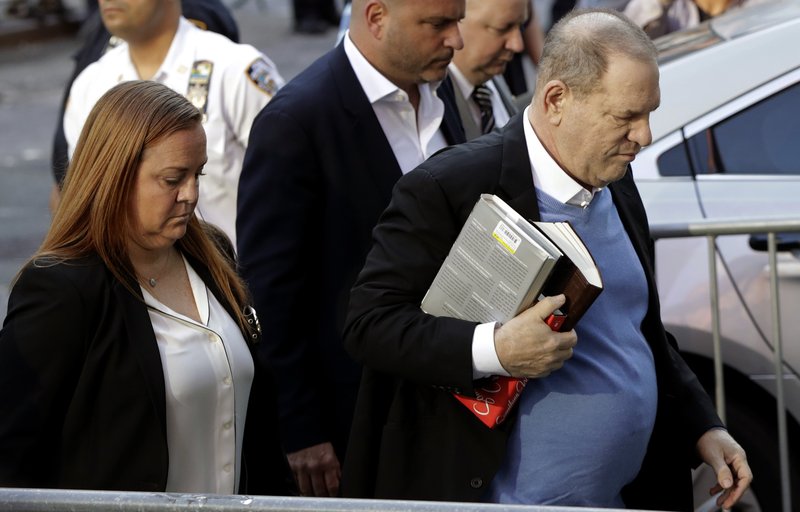Harvey Weinstein turned himself in to police Friday morning to face the first criminal charges to be filed against him after months of sexual abuse allegations from scores of women that destroyed his career and set off a national reckoning known as the #MeToo movement.
Weinstein, 66, stepped from a black SUV wearing a blazer and carrying books under his arm, and lumbered into a Manhattan police station before a crowd of news cameras. He didn’t respond to shouts of “Harvey!”
The exact charges against Weinstein still had not been made public early Friday. Two law enforcement officials told The Associated Press the case will include allegations by Lucia Evans, an aspiring actress who has said the Hollywood mogul forced her to perform oral sex on him in his office. She was among the first women to speak out about the producer.
One official said it’s likely the case also will include at least one other victim who has not come forward publicly.
The officials spoke Thursday to the AP on condition of anonymity because they weren’t authorized to discuss the investigation.
Weinstein was expected to be charged at least with criminal sexual act, a crime that carries up to 25 years in prison, the officials said.
Weinstein’s attorney, Benjamin Brafman, declined to comment when first contacted about the charges late Thursday, but previously said in court paperwork that the allegations that Weinstein forced himself on women were “entirely without merit” and that he never knowingly broke the law.
Evans confirmed to The New Yorker that she was pressing charges.
“At a certain point, you have to think about the greater good of humanity, of womankind,” she told the magazine.
Evans told The New Yorker in a story published in October that Weinstein forced her to perform oral sex during a daytime meeting at his New York office in 2004, the summer before her senior year at Middlebury College.
“I said, over and over, ’I don’t want to do this, stop, don’t,’” she told the magazine. “I tried to get away, but maybe I didn’t try hard enough. I didn’t want to kick him or fight him.”
Manhattan District Attorney Cyrus Vance had been under enormous public pressure to bring a criminal case against Weinstein. Some women’s groups, including the Hollywood activist group Time’s Up, accused the Democrat of being too deferential to Weinstein and too dismissive of his accusers.
A grand jury has been hearing evidence in the case for weeks.
In March, New York Gov. Andrew Cuomo took the extraordinary step of ordering the state’s attorney general to investigate whether Vance acted properly in 2015 when he decided not to prosecute Weinstein over a previous allegation of unwanted groping, made by an Italian model. That investigation is in its preliminary stages.
More than 75 women have accused Weinstein of wrongdoing around the globe. Several actresses and models accused him of criminal sexual assaults, but many of the encounters happened too long ago for any prosecution. Film actress Rose McGowan said Weinstein raped her in 1997 in Utah, “Sopranos” actress Annabella Sciorra said he raped her in her New York apartment in 1992 and Norwegian actress Natassia Malthe said he attacked her in a London hotel room in 2008.
McGowan told the AP on Thursday that she is gratified but “still in shock” that Weinstein was expected to surrender.
“The justice system has been something very elusive,” McGowan said. “I hope in this case it works. Because it’s all true. None of this was consensual.”
The statute of limitations for rape and certain other sex crimes in New York was eliminated in 2006, but not for attacks that happened prior to 2001.
New York City police detectives said in early November that they were investigating allegations by another accuser, “Boardwalk Empire” actress Paz de la Huerta, who told police in October that Weinstein raped her twice in 2010. She is not one of the victims in the case on Friday; hers was still pending, officials said.
Authorities in California and London also are investigating assault allegations. Britain has no statute of limits on rape cases; some of the allegations under investigation there date to the 1980s.
Harvey and his brother Bob Weinstein started his now-bankrupt company after leaving Miramax, the company they founded in 1979 and which became a powerhouse in ’90s indie film with hits like “Pulp Fiction” and “Shakespeare in Love.” The Weinstein Co. found success with Oscar winners “The Artist” and “The King’s Speech.”

